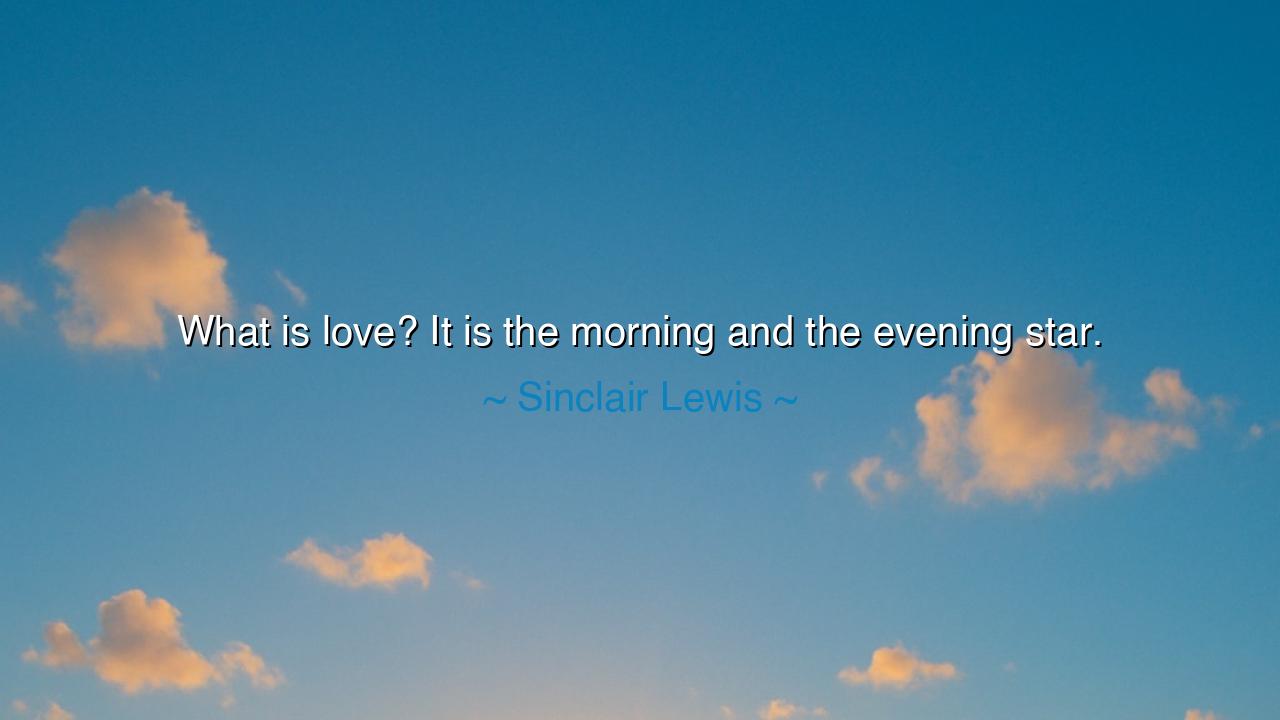
What is love? It is the morning and the evening star.






In words of luminous simplicity, Sinclair Lewis, the first American to win the Nobel Prize in Literature, once wrote: “What is love? It is the morning and the evening star.” Though brief as a breath, this saying burns with the quiet brilliance of eternity. It speaks of love not as mere passion or fleeting affection, but as something constant — a guiding light at both the dawn and the dusk of life. For the morning star heralds hope and beginnings, while the evening star watches over rest and endings. In these two lights, Lewis captures the entire cycle of existence, teaching that love is not bound by time. It is both the spark that awakens life and the radiance that softens its close.
The origin of these words can be traced to Lewis’s profound understanding of the human spirit. As a novelist, he saw clearly the beauty and the folly of mankind — its struggles, its longing, and its unending hunger for meaning. When he spoke of love as the “morning and evening star,” he was describing not romantic infatuation, but the enduring essence of love that outlives circumstance. He understood that love is what steadies the human heart when the day is young and uncertain, and what comforts it when the night grows near. It is the compass of the soul, shining quietly in moments of both joy and sorrow.
The morning star, that herald of dawn, represents love as hope — the kind that awakens us, fills us with courage, and urges us forward. It is the light that stirs the heart when life feels dark or directionless. When we fall in love, or when we give love freely to others, we feel this dawn within us — a renewal, a sense that life is worth living again. The evening star, by contrast, symbolizes love as peace — the gentle, enduring affection that remains when passion has cooled, when the storms of youth have passed. It is the love that watches over, forgives, and abides. In this way, love is both the beginning and the end — the flame that calls us to rise, and the glow that blesses our rest.
Consider the story of Pierre and Marie Curie, bound together not only by affection but by shared purpose. Their love was not born of idle romance but of devotion — to each other and to truth. Together they worked long nights in cold laboratories, their bond illuminated by the same radiance they studied in the elements. When Pierre died suddenly, Marie continued their work, carrying forward the light they had kindled together. Her love did not die with him; it became her morning star — her source of purpose — and her evening star — her comfort in solitude. Their story reveals what Lewis saw so clearly: that love, in its purest form, transcends time, loss, and even death.
This understanding of love belongs not only to lovers, but to all who live with care and compassion. For love is not merely the bond between two hearts; it is the invisible thread that weaves humanity together. It is what inspires the artist to create, the parent to sacrifice, the friend to forgive. Love is what makes the world bearable, even beautiful. Without it, the human soul wanders like a ship without a star to steer by. With it, every journey — no matter how long or uncertain — finds meaning.
Yet, to live by love requires courage. The ancients knew that to love deeply is to risk pain, for love demands vulnerability. It is to let another touch the tender parts of the soul, to trust that what is shared in light will survive the shadows. But as Lewis’s words remind us, love is not diminished by darkness; it is revealed by it. The same stars that guide us at dawn shine all the brighter at night. So, too, does love become most radiant when tested by distance, hardship, or loss.
Therefore, dear listener, let these words be a lamp for your heart: seek love not as a passing fire, but as a guiding star. Let it lead you through the uncertainties of morning, and sustain you in the silence of evening. Nurture it in your actions — through kindness, patience, and presence. When anger tempts you, choose gentleness; when fear whispers of loss, remember that true love, once given, is never lost. For like the stars, it may vanish from sight for a while, but it still burns beyond the horizon, constant and sure.
And so, as Sinclair Lewis teaches, love is both the beginning and the end, the light of birth and the lamp of farewell. It is the one eternal truth in a world of change — the force that wakes us each morning with purpose, and closes each night with peace. To love, and to live by that love, is to walk through life guided by the stars — steadfast, radiant, and unafraid.






AAdministratorAdministrator
Welcome, honored guests. Please leave a comment, we will respond soon